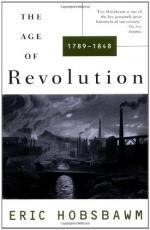
|
| Name: _________________________ | Period: ___________________ |
This quiz consists of 5 multiple choice and 5 short answer questions through Science and Conclusion: Towards 1848.
Multiple Choice Questions
1. What was the international congress that ruled Europe called?
(a) The Concert of Europe.
(b) The League of Nations.
(c) The European Assembly.
(d) The European Convention.
2. How large were the circles within which people moved in the late 1700s, according to Hobsbawm?
(a) They were much more spread out.
(b) Much larger than today.
(c) Much smaller than today.
(d) Smaller than today for some people, but larger for others.
3. In what way does Hobsbawm say that the sympathies of those in power were split in the early 1800s?
(a) They were torn between exhaustion with warfare, and the need to expand their territory.
(b) They were caught between expensive colonialism abroad, and lack of tax revenues at home.
(c) They were caught between wanting to industrialize, but also to keep their culture the same.
(d) Those in power were torn between ideological affection for democracy, but faith in the elite as rulers.
4. What crucial event does Hobsbawm say took place during the period after the French Revolution?
(a) The invention of the cotton gin.
(b) The discovery of Australia.
(c) The abolition of the slave trade.
(d) The development of paper currency.
5. Where did Britain expand its relationships after the French Revolution?
(a) With Russia and Prussia.
(b) With its colonies.
(c) With France and Spain.
(d) With China and Indonesia.
Short Answer Questions
1. What began to develop as industrialism developed in Europe?
2. What tool did the upper classes use to discriminate against the working poor?
3. What idea does Hobsbawm say was just being developed after the turning point of 1830?
4. How did the people in political power react to middle class ideology, in Hobsbawm's account?
5. What capability was open to the middle class, as a result of the age of revolutions, that was not open before the revolutions?
|
This section contains 347 words (approx. 2 pages at 300 words per page) |

|




